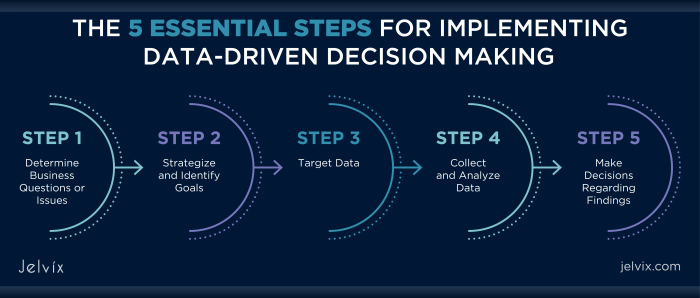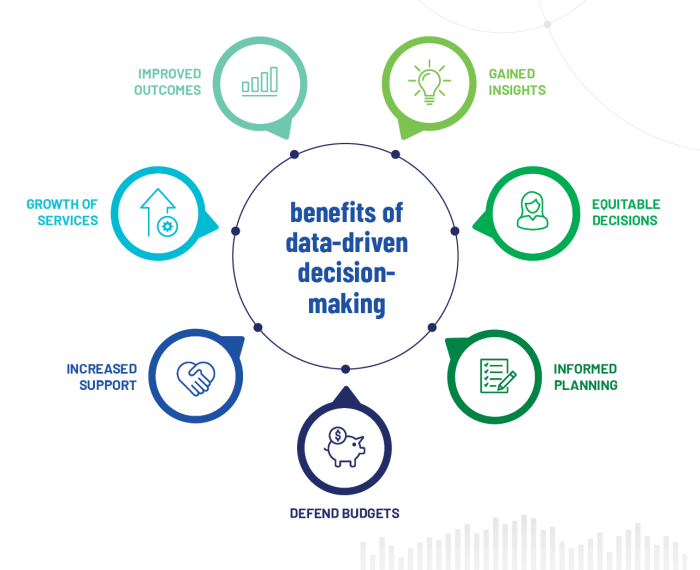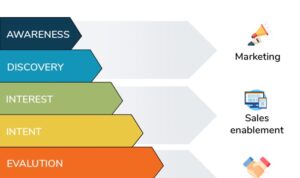Data-Driven Decision Making sets the stage for informed choices in various industries, shedding light on the power of data in shaping business operations. As we delve deeper into this realm, a world of possibilities unfolds, showcasing the transformative nature of data-driven strategies.
Introduction to Data-Driven Decision Making
Data-driven decision making is the process of using factual data and analytics to guide business strategies and actions. By analyzing data, organizations can make informed decisions that are based on evidence rather than intuition alone.
Examples of Industries, Data-Driven Decision Making
- Healthcare: Hospitals use data to analyze patient outcomes and improve treatment protocols.
- Retail: E-commerce platforms use data to personalize marketing efforts and optimize inventory management.
- Finance: Banks use data to detect fraud and assess credit risk.
Benefits of Data-Driven Decision Making
- Increased Efficiency: Data-driven decisions lead to streamlined processes and reduced operational costs.
- Improved Accuracy: Data analysis provides more accurate insights compared to gut feelings or assumptions.
- Enhanced Performance: By leveraging data, businesses can identify opportunities for growth and innovation.
Importance of Data Quality
In the world of data-driven decision making, the quality of the data you use is absolutely crucial. High-quality data is like the foundation of a strong building – without it, everything else can crumble.
Poor data quality can lead to inaccurate decision-making, which can have serious consequences for businesses, organizations, and even individuals. Imagine relying on data that is incomplete, outdated, or riddled with errors – the decisions made based on such data could be way off the mark.
Strategies for Ensuring Data Quality and Integrity
Ensuring data quality requires a proactive approach. Some strategies to maintain data quality and integrity include:
- Regular data cleaning and validation processes to identify and correct errors.
- Implementing data governance policies and standards to ensure consistency and accuracy.
- Investing in data quality tools and technologies to automate processes and improve accuracy.
- Training staff on data management best practices to maintain high standards of data quality.
Tools and Technologies for Data Analysis

When it comes to data analysis for decision-making processes, there are several popular tools and technologies that are widely used in the market. These tools play a crucial role in helping organizations derive valuable insights from the data they collect.
Popular Tools for Data Analysis
One of the most popular tools for data analysis is Microsoft Excel, which is widely used for basic data manipulation and analysis. Another popular tool is Tableau, known for its powerful visualization capabilities that help in interpreting data effectively. Python and R are popular programming languages used for statistical analysis and machine learning.
Different Data Analytics Technologies
There are various data analytics technologies available in the market, each with its unique features and capabilities. Some of the common technologies include SQL for querying databases, Apache Hadoop for processing large datasets, and Apache Spark for real-time data processing. Machine learning technologies like TensorFlow and scikit-learn are also widely used for predictive analytics.
How These Tools Help in Deriving Valuable Insights
These tools and technologies help organizations in deriving valuable insights from data by enabling them to analyze large datasets efficiently, visualize data in a meaningful way, and build predictive models to forecast future trends. By harnessing the power of data analysis tools, businesses can make informed decisions based on data-driven insights.
Implementing Data-Driven Culture: Data-Driven Decision Making

Creating a data-driven culture within an organization is crucial for making informed decisions and staying competitive in today’s market. It involves incorporating data into every aspect of the business to drive performance and innovation.
Steps to Foster a Data-Driven Culture
- Leadership Support: Top management must champion the use of data and set an example for others to follow.
- Educating Employees: Providing training and resources to help employees understand the value of data-driven decision making.
- Creating Data Literacy Programs: Developing programs to improve data literacy among employees at all levels of the organization.
- Setting Clear Goals: Defining specific goals and KPIs that can be measured using data to track progress.
- Implementing Data-Driven Technologies: Investing in tools and technologies that enable data collection, analysis, and visualization.
Challenges Faced When Transitioning to a Data-Driven Approach
- Resistance to Change: Employees may be resistant to adopting new ways of working and relying on data for decision making.
- Data Quality Issues: Ensuring that the data being used is accurate, reliable, and up-to-date can be a major challenge.
- Cultural Shift: Changing the mindset of employees to prioritize data over gut feelings or intuition can be a slow process.
- Integration of Data Sources: Consolidating data from multiple sources and systems to get a complete view of the business can be complex.
Examples of Successful Companies Embracing a Data-Driven Culture
- Amazon: Amazon uses data extensively to personalize recommendations, optimize logistics, and improve customer experience.
- Netflix: Netflix leverages data to recommend content, analyze viewer preferences, and create original shows based on data insights.
- Google: Google’s entire business model is built on data-driven decision making, from search algorithms to advertising targeting.
- Facebook: Facebook uses data to personalize user experiences, target ads, and improve the platform’s overall performance.
Ethical Considerations in Data-Driven Decision Making
When it comes to using data to drive decision-making, there are important ethical implications that must be considered. It is crucial to ensure that data privacy and security are maintained while leveraging data for making decisions. Additionally, being aware of the potential risks associated with unethical data practices in decision-making processes is essential to maintain trust and integrity.
Data Privacy and Security
- Protecting sensitive information: Organizations must ensure that personal data is securely stored and only accessible to authorized personnel.
- Compliance with regulations: Adhering to data protection laws and regulations such as GDPR is crucial to avoid legal consequences.
- Implementing encryption: Encrypting data both in transit and at rest can help prevent unauthorized access.
Risks of Unethical Data Practices
- Bias in decision-making: Biased data or algorithms can lead to unfair outcomes and discrimination against certain groups.
- Data breaches: Inadequate security measures can result in data breaches, compromising the privacy of individuals and damaging the organization’s reputation.
- Misuse of data: Using data for purposes other than what it was intended for can violate trust and ethical standards.





